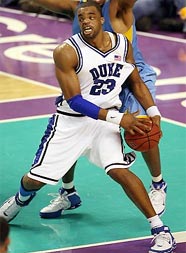Sin #7: Politics and Pedigree
 |
Like most things in life the NBA draft does not come without politics, which can sometimes be the driving force behind draft selections that don't add up. And when it comes to a player's pedigree, politics almost always seems to be in the mix. Pedigree is generally defined as "a known line of descent". In the basketball world pedigree can translate into the college a player attended, his past accomplishments in high school, or who his parents are. Unfortunately, pedigree appears to boost certain players on draft night and contributes to quality players being selected lower on the board or left totally undrafted.
The School Lineage Quandary
In the 2006 NBA draft Shelden Williams, labeled by most as a dominant defensive player, was the so called Landlord in college basketball. Never mind that he was regularly outplayed by smaller players like North Carolina’s Sean May and Tyler
 |
|
Shelden Williams
|
In every game I watched, Williams was on the receiving end of a nifty low post move that would send this the too eager shot blocker off his feet. And when matched physically a mean streak never came through. This would not have been so bad of a selection if he went 5 to 8 picks later. So a year and a half later the Landlord himself was evicted as the Hawks took Al Horford with the third pick in the 2007 NBA Draft.
Then there's Julius Hodge from the 2005 NBA draft. Coming out of high school he was mister everything as a top 5 player nationally, a McDonald’s All-American, and the top rated shooting guard at his position. Upon entering North Carolina State, Hodge was viewed as one of the school’s finest recruits and spent the next fours years leading the school to four consecutive NCAA tournaments while scoring over 2,000 points. So what's the problem?
 |
|
Julius Hodge
|
The Parent Trap
How many times have you heard someone talk about a 2nd generation prospect without hearing who his parents were? In the 2008 NBA draft this was evident more than ever. While I'll exclude Kevin Love as the exception in this case, Danilo Gallinari and Patrick Ewing_Jr. definitely got extra props because of their blood line. Gallinari was constantly mentioned with the fact that his father, Vittorio, was a professional who played alongside Mike D'Antoni in Italy. But unlike his offensive minded son, Vittorio was a defensive stopper with limited scoring ability.
Patrick Ewing_Jr. was constantly referenced with his Hall of Fame bound father Patrick Ewing. But like Gallinari, the Ewing tandem has some vast differences. Ewing Jr. is a small forward with average offensive ability while the elder Ewing was a sweet shooting center. I partly understand the reason behind this as I know some people use it as mere information filler, but others will use it as a point of validness to hype a player's abilities, as if Ewing Jr. and Gallinari are better prospects because of who their parents.
The Danilo Gallinari selection seems to have a tad to do with his father, who in reality was nothing more than a role player in Europe, but Ewing Jr. clearly
 |
|
Like Father Like Son?
|
The many times over deadly factors of politics and pedigree are a frustrating aspect of the NBA draft that should be kept in the proper perspective, but in next year’s draft or in years to come, the issue will occur again and again. In the end, however, it's talented players like Gary Forbes who will prove themselves, have the last word, and rise out the political mess. Family, favors, or riding off the fumes of an impressive past can only help so much before results have to be produced. That's when all the dirt comes out in the wash. I wish nothing but luck to the players mentioned in the Deadly Sins series and truly hope they all have solid careers, but for GMs who continue to bask in these sins there is a startling fact to consider - only 5 out of the 30 current NBA General Managers have lasted over ten years...time waits for no man.
| Sins 1 & 2 |
| Sin 3 |
| Sin 4 |
| Sin 5 |
| Sin 6 |
